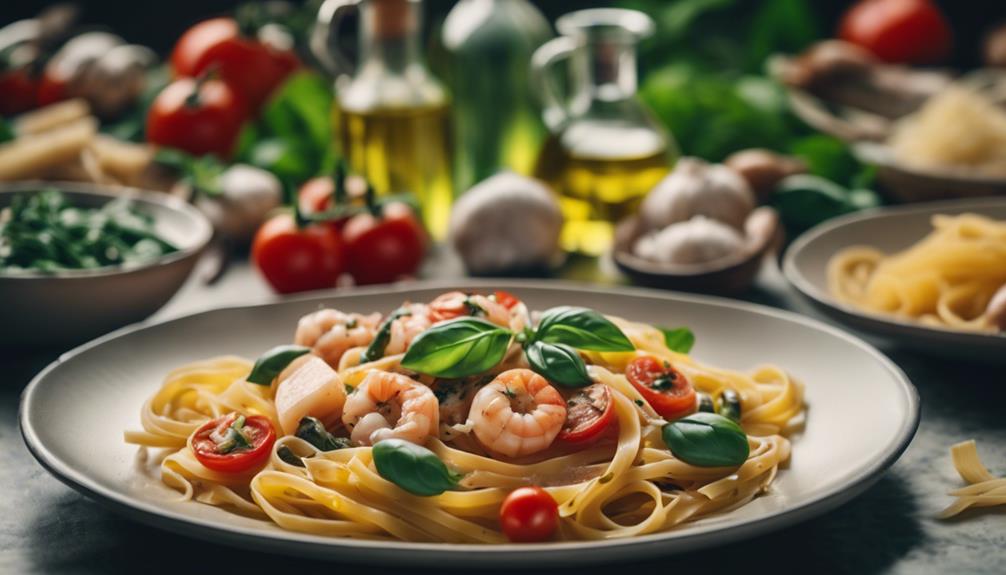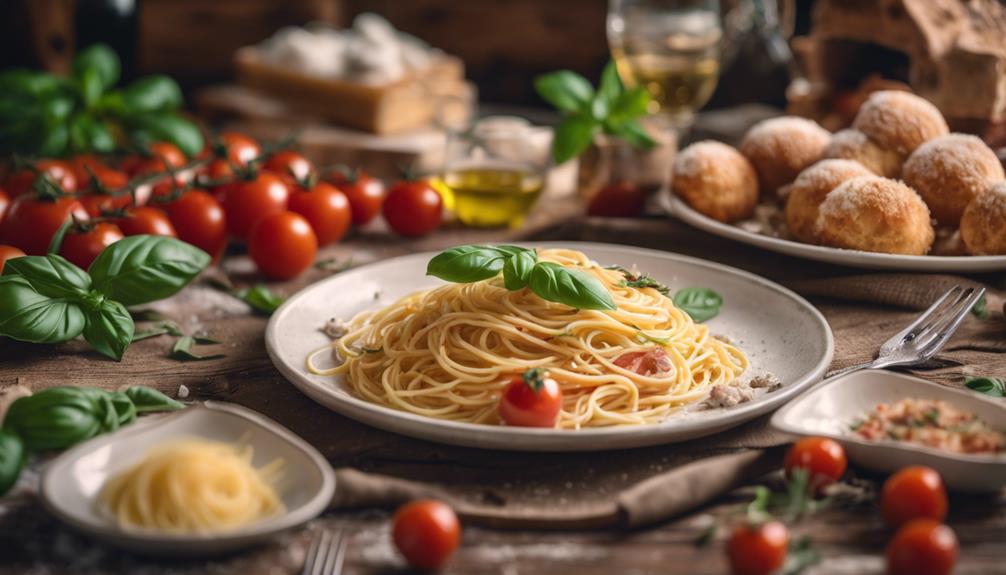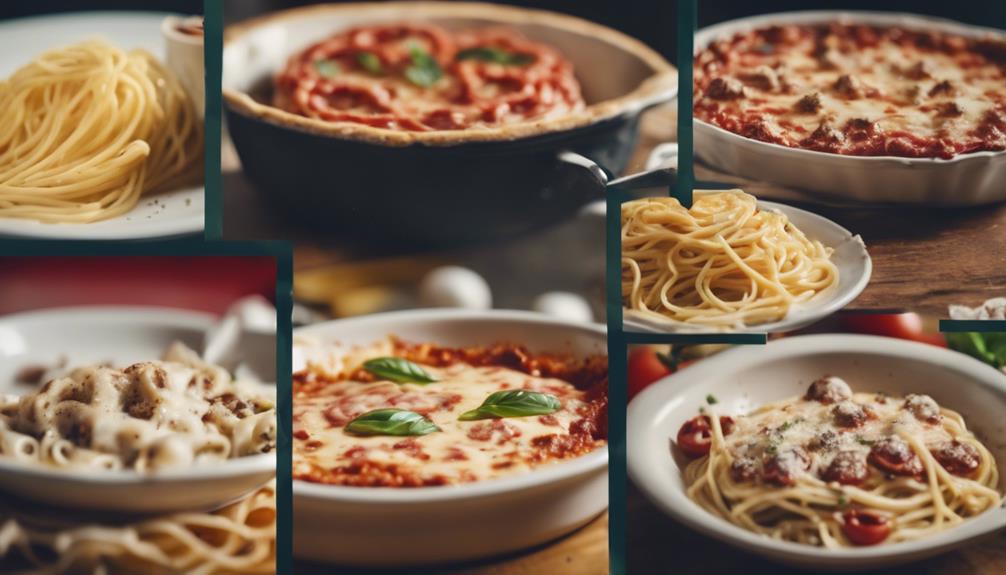Italian cuisine is a goldmine of nutrition! You can reap the benefits of antioxidants from tomatoes, essential vitamins in olive oil, and omega-3 fatty acids from seafood. Fiber-rich whole grains help with digestion, while cheeses provide calcium and protein to strengthen bones. In addition, the fresh herbs add flavor and extra nutrients. There is a plethora of goodness in each bite of Italian food waiting for you to explore even more amazing benefits.
Key Takeaways
- Antioxidants like lycopene in tomatoes combat cell damage and promote heart health.
- Olive oil's monounsaturated fats and antioxidants support cardiovascular health and reduce inflammation.
- Seafood in Italian cuisine provides omega-3 fatty acids for heart health and cognitive function.
- Whole grains in Italian dishes offer fiber for digestion and essential nutrients like magnesium.
- Cheeses like mozzarella and parmesan are rich in calcium and protein for bone health and strong teeth.
Antioxidants From Tomatoes
Boost your antioxidant intake with the rich source of vitamins and nutrients found in tomatoes in Italian dishes. Tomatoes are packed with antioxidants like vitamin C, lycopene, and beta carotene, which play an essential role in protecting your cells from damage.
The lycopene in tomatoes, known for its vibrant red color, not only adds a pop to your favorite Italian dishes but also helps reduce the risk of certain cancers and promotes heart health.
When you indulge in tomato-based Italian cuisine, you're not just treating your taste buds; you're also giving your body a significant dose of antioxidants. These antioxidants work tirelessly to combat cell damage and support your overall health.
So, whether you're savoring a classic pasta pomodoro or delighting in a hearty marinara sauce, each bite is a step towards a healthier you.
Next time you reach for that delicious Italian dish with tomato sauce, remember you're not just enjoying a meal – you're nourishing your body with a bounty of antioxidants.
Vitamin-Rich Olive Oil
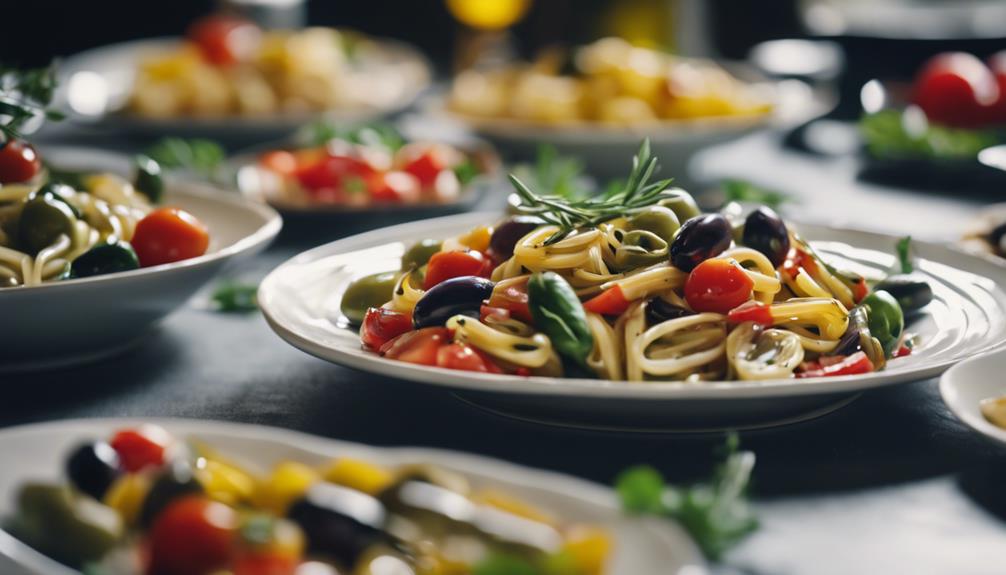
Enhance the nutritional profile of your Italian dishes with the vitamin-rich goodness of olive oil. Olive oil isn't only a flavorful addition to your meals but also a powerhouse of health benefits. Packed with monounsaturated fats, it offers heart-healthy advantages by improving cholesterol levels and reducing the risk of heart disease.
The antioxidants present in olive oil help combat inflammation, supporting cardiovascular health and overall well-being. Moreover, the vitamin E found in olive oil promotes cell regeneration and contributes to skin health.
By incorporating olive oil into your cooking, you can enjoy these benefits while adding a delicious touch to your favorite Italian dishes. Regular consumption of olive oil has been linked to a decreased risk of chronic diseases, making it a valuable addition to your diet.
Omega-3 Fatty Acids From Seafood
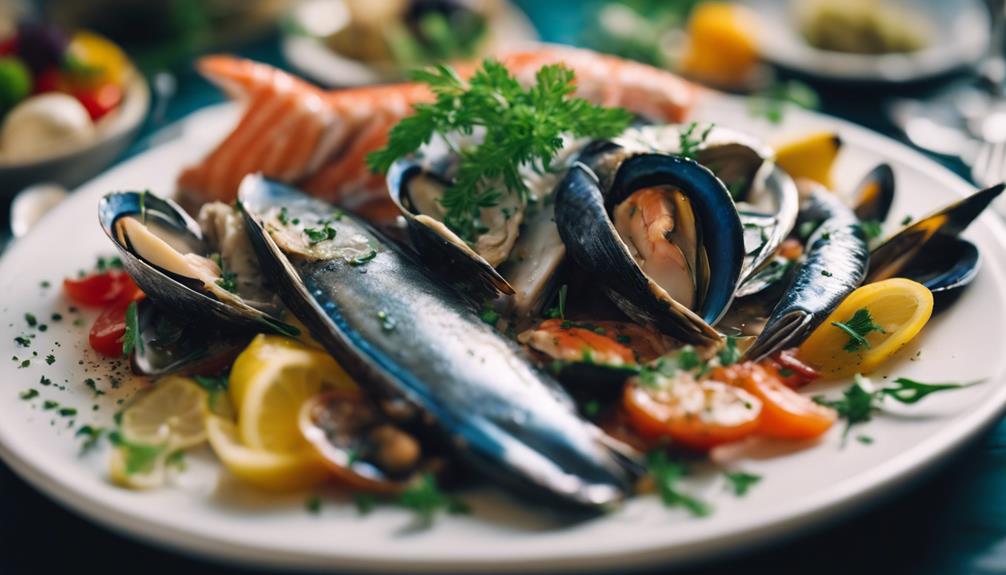
Seafood in Italian dishes serves as a vital source of omega-3 fatty acids, supporting heart health and reducing inflammation in the body. Omega-3 fatty acids found in seafood like salmon, sardines, and anchovies are essential for maintaining a healthy heart.
By including these delicious seafood options in your Italian meals, you're not only treating your taste buds but also taking care of your cardiovascular system. The omega-3 fatty acids play an important role in lowering inflammation levels, which is beneficial for overall well-being.
Regularly enjoying seafood in Italian cuisine can also help in managing cholesterol levels, reducing the risk of heart disease, and improving cognitive function.
Fiber From Whole Grains
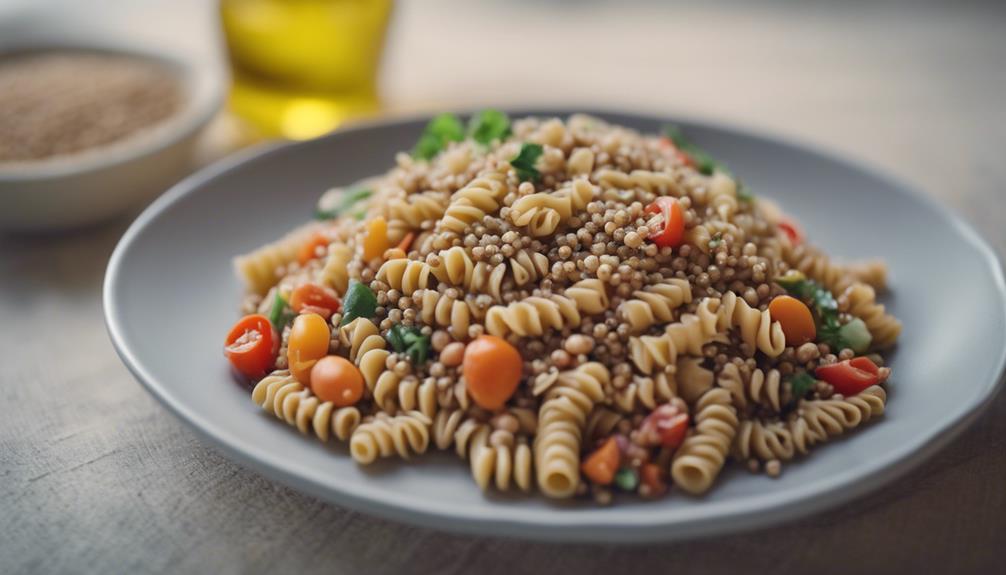
Hey there, ready to boost your fiber intake with some delicious Italian dishes?
Whole grains are your best friend when it comes to fiber-rich ingredients. They not only support digestion but also help keep your blood sugar levels in check.
Whole Grain Benefits
Incorporating whole grains into your Italian dishes guarantees you benefit from the fiber-rich foods that promote better digestion and heart health. Whole grains like farro, barley, and whole wheat pasta are staples in Italian cuisine, offering a delicious way to boost your fiber intake. Let's take a look at some of the key benefits of including whole grains in your meals:
| Benefits | Description |
|---|---|
| Lower Cholesterol Levels | The fiber in whole grains helps reduce LDL cholesterol, thereby improving heart health. |
| Stable Blood Sugar Levels | Whole grains prevent rapid spikes in blood sugar, making them ideal for diabetes management. |
| Support Digestive Health | Fiber aids in digestion and prevents constipation, promoting a healthy gut. |
| Essential Nutrients | Whole grains provide essential nutrients like magnesium and vitamin E for overall well-being. |
Fiber-Rich Ingredients
Enhance the nutritional value of your Italian dishes by incorporating fiber-rich ingredients sourced from whole grains like farro, barley, and polenta. These fiber-rich ingredients play an important role in promoting digestive health, aiding in weight management, and regulating blood sugar levels. Whole grains present in Italian cuisine provide essential nutrients that support overall well-being.
Fiber from whole grains, commonly found in pasta, bread, and risotto in Italian dishes, helps maintain a healthy digestive system. By incorporating whole grains like farro, barley, and polenta into your meals, you can enjoy the benefits of improved digestive health and better weight management.
Moreover, the fiber content from whole grains in Italian cuisine assists in regulating blood sugar levels and lowering bad cholesterol, contributing to a balanced diet. So, next time you prepare an Italian meal, remember to include these fiber-rich whole grains for a delicious and nutritious boost to your dishes.
Calcium and Protein From Cheeses
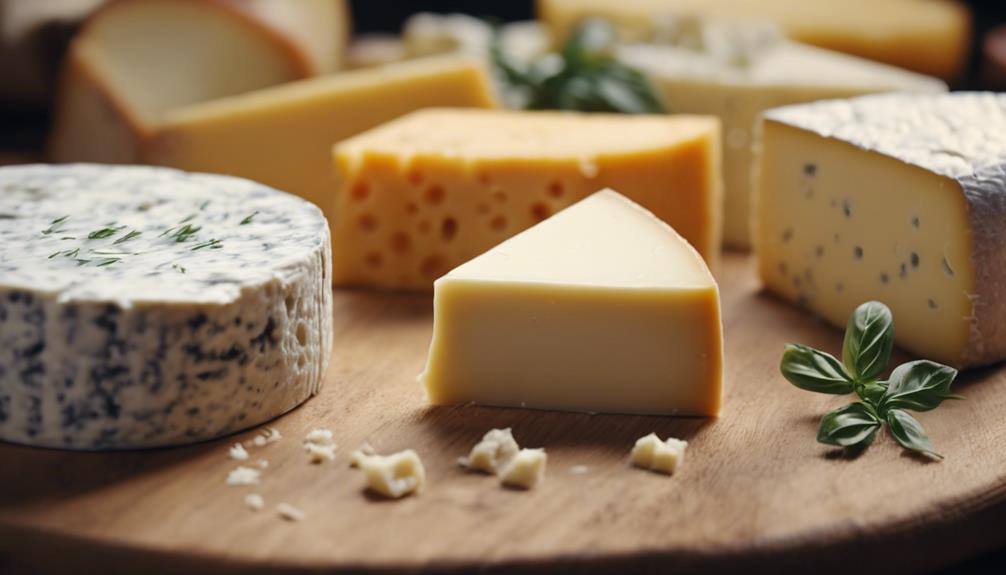
Cheeses like mozzarella and parmesan found in Italian dishes pack a punch when it comes to essential nutrients. They aren't just delicious additions but also great sources of calcium and protein.
Cheese as Calcium Source
Rich in calcium and protein, Italian cheeses like mozzarella are excellent additions to your diet for promoting bone health. When enjoying Italian cuisine, incorporating cheeses such as ricotta, Parmesan, and pecorino romano can greatly boost your calcium intake. These cheeses not only enhance the flavors of Italian dishes but also provide essential nutrients for your overall health.
Ricotta cheese, with its creamy texture, offers a good source of protein and calcium, making it a versatile ingredient in various Italian recipes. Parmesan cheese, known for its rich and robust flavor, is particularly high in calcium, important for maintaining strong bones and teeth. Additionally, cheeses like pecorino romano contribute to your daily calcium requirements, supporting excellent bone strength.
Incorporating Italian cheeses into your meals not only adds a delicious touch but also ensures you're getting a healthy dose of calcium and protein.
Protein in Italian Dishes
Italian dishes, particularly those featuring cheeses like mozzarella, ricotta, and parmesan, offer a significant source of protein essential for muscle repair and growth. These cheeses aren't only rich in flavor but also packed with valuable nutrients like protein and calcium.
The protein found in cheeses from Italian cuisine provides the necessary amino acids required for muscle repair, supporting bone health and muscle function. For example, mozzarella cheese, a staple in many Italian dishes such as pizzas and salads, offers a good amount of protein per serving, making it a delicious and nutritious choice.
By including these cheeses in your Italian meals, you can contribute to meeting your daily protein requirements while enjoying the rich and savory flavors they bring to the table.
Health Benefits of Fresh Herbs
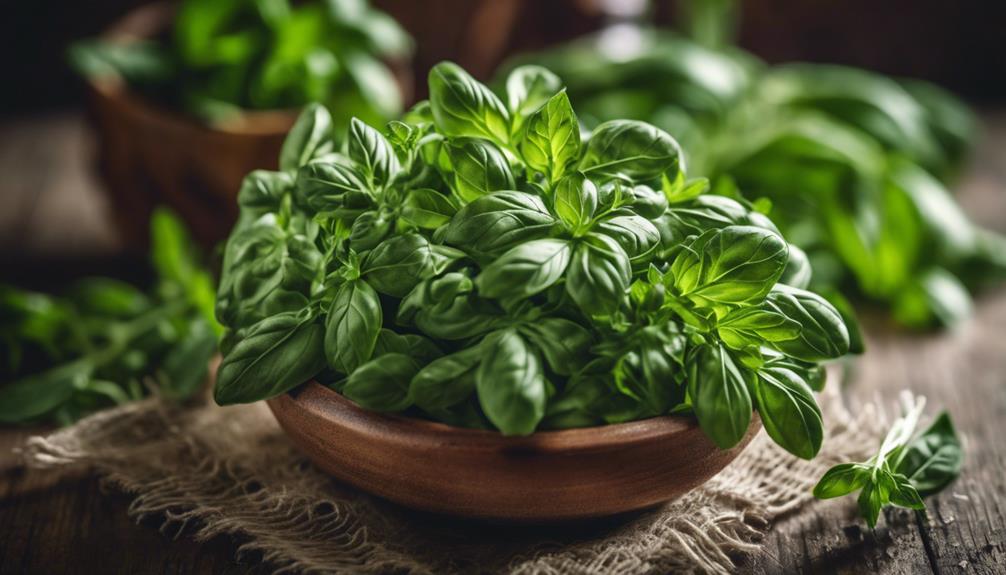
Incorporating fresh herbs like basil, parsley, and oregano in Italian dishes brings numerous health benefits to your diet. These herbs are packed with antioxidants, vitamins A and C, and anti-inflammatory properties that can enhance your overall well-being.
Basil, for example, not only adds a burst of flavor but also provides essential nutrients like vitamin K, manganese, and flavonoids that support heart health and cell protection.
Oregano, another staple herb in Italian cuisine, is rich in antioxidants and may even have antibacterial properties, contributing to its health-promoting effects.
Frequently Asked Questions
What Nutrients Are Commonly Found in Dishes in Italy?
In dishes in Italy, you'll find a rich array of essential nutrients. Fresh veggies, fruits, olive oil, grains, seafood, beans, and dark leafy greens provide vitamins, fiber, omega-3s, proteins, and antioxidants vital for health.
How Nutritious Is Italian Food?
Italian food is highly nutritious, offering a range of health benefits. You can enjoy essential nutrients like vitamins A, C, and E from vegetables, grains, and olive oil. The Mediterranean diet promotes heart health and overall well-being.
What Is a Common Component in Many Italian Dishes?
In many Italian dishes, a symbol of tradition and flavor shines through – the common component that unites them all is passion. It infuses each dish with heart, making every bite a celebration.
What Is the Nutrition in Italy Culture?
In Italy, nutrition is rich in essential vitamins and minerals. The Mediterranean diet, prevalent in Italy, supports heart health and overall well-being. Fresh, local ingredients like vegetables, olive oil, and grains contribute to a balanced diet.
What Nutrients Can I Expect to Get from Popular Italian Dishes?
When enjoying most popular Italian dishes, you can expect to get a variety of nutrients. For example, pasta dishes are a good source of carbohydrates, while tomato-based sauces provide vitamins A and C. Cheese used in many dishes offers calcium and protein, and olive oil contains heart-healthy fats.
Conclusion
So, next time you indulge in a delicious Italian dish, remember you're not just satisfying your taste buds, but also treating your body to a nutrient-packed feast!
From antioxidants in tomatoes to omega-3 fatty acids in seafood, Italian cuisine is a powerhouse of vitamins and minerals.
So go ahead, enjoy that cheesy pasta or fresh herb-infused salad guilt-free – your body will thank you for it!
Buon appetito!
